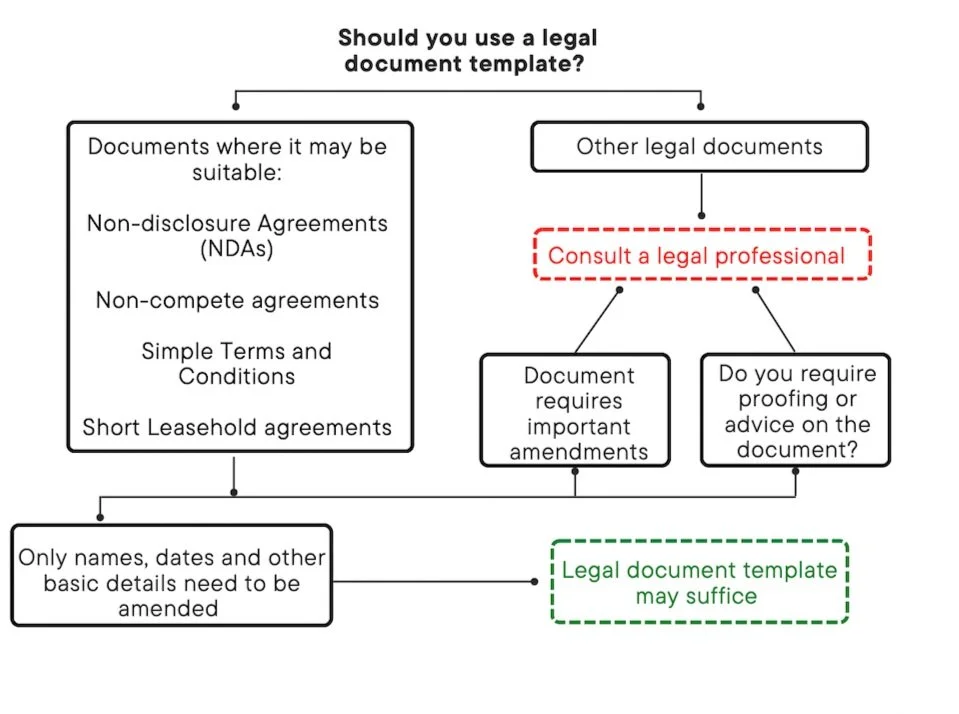Navigating Legal Document Templates: Risks and Rewards for Startups
It is tempting to use a DIY template form to fill out a legal document rather than contacting a legal professional. There are limited circumstances where this could be beneficial. However, in most cases, it may be detrimental to your business.
If you are an established company or entity, making use of legal document templates is not advisable due to the risk and potential liability attached; it is often startups or individuals who may be interested in their use.
Legal document templates should in no way replace legal counsel. They are very general documents that you may be able to tailor to your needs, whereas legal counsel offers bespoke advice on your specific legal needs taking into account your particular circumstances.
A Forbes article on this very topic explained it perfectly:
“Legal agreements are like prescription glasses. Someone else’s are most likely not going to be right for you.”
So why opt for a legal document template at all?
Legal templates can offer many benefits to the user, including :
Easy and quick access
Simple to fill out
The ability to tailor the documents to your needs (in limited circumstances)
An (often) cheap way to obtain these documents
For startups, it saves time and money and allows them to focus on what is most important - their business. Legal templates may suffice where there are no major alterations, such as changing the parties or adding and removing simple terms. Examples of contracts where a template may be suitable include:
Non-disclosure Agreements (NDAs)
Non-compete Agreements
Simple Terms and Conditions
Simple Privacy Policy
Short Leasehold Agreements
If the legal document requires simply filling details out, limited to basic points, such as a name or address, a legal document template may suffice.
However, it's likely these documents only offer a starting point or the bare minimum for what your business will need. If any changes, amendments, or advice are required, a legal professional will need to be consulted. Additionally, a poorly drafted legal document may offer competitors the ability to scrutinise, or other parties the ability to discover and make use of loopholes, at which point instructing legal counsel will be required.
Considering the reliability of the source you are using is critical. Several law firms and organisations provide free/subscription-based templates for anyone to use. For example, Thomas Reuters Legal allows you to access expertly written legal documents for free when you join their Practical Law subscription. Ensure you use the most reputable sources to avoid preventable issues.
Any amendments to legal documents, no matter how small, could invalidate the document. Changes should be completed with the advice of a legal professional, at which point it would make more sense to instruct a legal professional to create a bespoke document.
In the case of most contracts and documents, you shouldn't even entertain the idea and directly seek legal advice. Particularly in regards to:
Wills – many laws and regulations determine the proper drafting of a will, so it's best to get it done by a legal professional.
Articles of Association;
Shareholder’s Agreement;
Divorce Documents;
Contracts for Sale of Land;
Any complex contract, agreement, etc. – even if it is considered a basic form, if there is something unusual or unique to include, it is best to get a legal professional to draft it.
The logical way to determine whether a legal document template will suit your needs is to consult a legal professional in the first place. They may even inform you of specific template packs available for startups or highlight the risks (if any) in your specific circumstance of choosing that route.
Authors: Niccolo Guastella, Ilona Munn, Sofia Martiello and Aminoor Masoom
-
Authors: Niccolo Guastella, Ilona Munn, Sofia Martiello and Aminoor Masoom -
In partnership with:
DISCLAIMER
This article has been written by law students for the sole purpose of providing informative insight. The information in this article is intended for educational purposes only and does not constitute legal advice, nor should the information be used for the purpose of advising clients. You should seek independent legal advice before relying on any of the information provided in this article.
Sources
Forbes Council post , 'Three Things To Consider Before Using Online Legal Templates' (Forbes, 16 June 2016) <https://www.forbes.com/sites/forbeslegalcouncil/2016/06/16/three-things-to-consider-before-using-online-legal-templates/?sh=696b0269574b> accessed 4 May 2022
Charles Breqcue, 'Why one template will never be enough' (Legislate, 9 November 2021) <https://www.legislate.tech/post/why-one-template-will-never-be-enough> accessed 4 May 2022
Micheal Barrons, 'Why Legal Templates and Legal Document Software are a Must For Law Firms' (Infoware , 3 October 2016) <https://infowaregroup.com/blog/why-legal-templates-and-legal-document-software-are-a-must-for-law-firms> accessed 4 May 2022
'When to use a Template vs When to see a Lawyer' (Youlegal, 9 July 2014) <https://youlegal.com.au/you-legal-blogs/when-to-use-a-template-vs-when-to-see-a-lawyer> accessed 4 May 2022
'Practical Law agreements, contracts, and clauses' (Thomas Reuters) <https://legal.thomsonreuters.com/en/products/practical-law/contracts-agreements-clauses> accessed 4 May 2022
